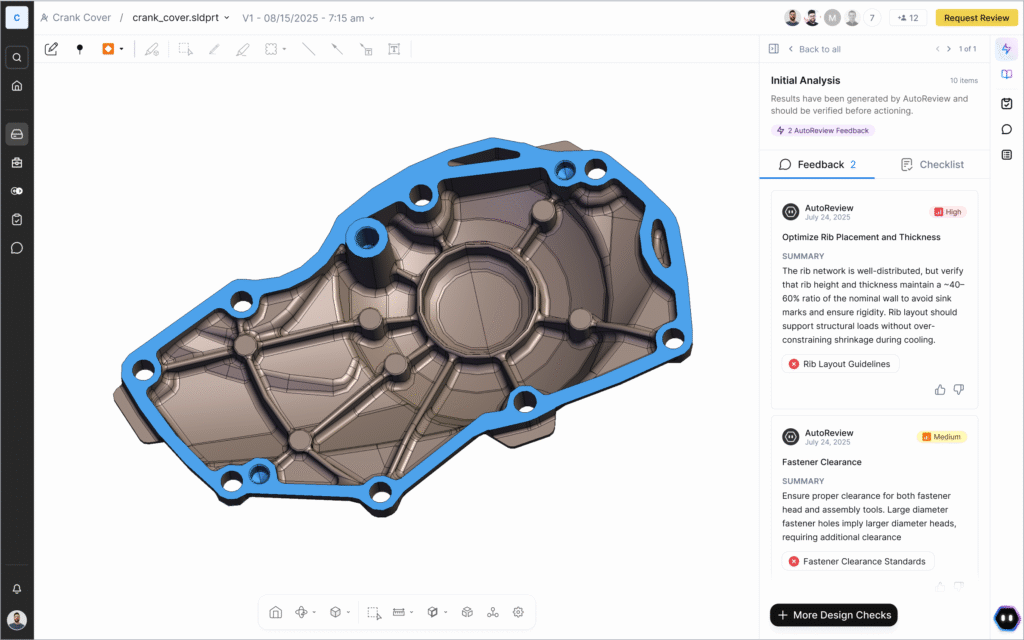The advent of AI and automation tools has created significant shifts in operational efficiency across various industries, particularly in engineering and manufacturing. CoLab’s AutoReview stands out as an innovative tool that seeks to enhance the design review process in these sectors. By examining how AutoReview compares with other platforms in terms of strengths, weaknesses, costs, return on investment (ROI), and scalability, SMB leaders and automation specialists can better assess its suitability for their organizations.
AutoReview purports to improve productivity by automatically reviewing 2D drawings and 3D models to pinpoint common issues such as design flaws and manufacturing concerns. One of the major strengths of AutoReview lies in its capacity to analyze files across multiple platforms, including Creo, NX, SolidWorks, and CATIA. This multi-platform support ensures that organizations are not locked into a single ecosystem, thus enhancing the tool’s scalability. Unlike many automation platforms that require extensive customization to fit various workflows, AutoReview operates within CoLab’s secure environment, facilitating easy integration with existing Product Lifecycle Management (PLM) systems. This not only safeguards intellectual property but also fosters a more streamlined review process.
In contrast to tools like Make and Zapier, which excel in automating workflows among disparate software applications, AutoReview thoroughly focuses on design accuracy. Make and Zapier are versatile in creating automated workflows but might not possess the specialized functionality required for nuanced engineering tasks. For engineering firms that prioritize design integrity over process automation, AutoReview offers a more targeted solution.
However, the success of AutoReview should be contextualized within its operational costs. While it is currently in beta testing with companies like Techtronic Industries and TPI Composites—two firms notable for their rigorous design processes—the exact pricing details remain vague. Citing high-profile beta testing companies may bolster the platform’s reputation, yet prospective buyers would benefit from clearer pricing models. A transparent cost structure is vital for small and mid-sized businesses (SMBs) trying to evaluate ROI effectively. Estimates indicate that in domains like automotive manufacturing, where the US industry faced over $12 billion in warranty claims in 2024, tools like AutoReview could help mitigate these costs significantly through early issue detection and error reduction.
A critical aspect to consider is ROI, especially as companies grapple with rising product development expenses influenced by unforeseen delays and corrective measures. AutoReview can ostensibly yield significant savings by decreasing scrap rates and potential warranty claims, thus impacting profitability positively. Furthermore, it offers the capability to automatically surface lessons learned from earlier designs, which is invaluable for engineering teams aiming to avoid the pitfalls of idiomatic errors that could lead to exponential costs. These features position AutoReview favorably compared to general automation platforms that may not specifically target design-related issues.
Scalability is another crucial factor when evaluating automation tools. AutoReview’s ability to operate in conjunction with various CAD systems allows it to scale up efficiently as organizations grow or diversify their product lines. Unlike more generalized tools, it does not require a complete overhaul of existing systems to implement; this minimizes disruption while maximizing usability. In contrast, platforms like OpenAI and Anthropic, while powerful for various applications in data processing and natural language understanding, may require more significant investment in time and resources to adapt to specific engineering needs, such as design reviews.
Moreover, AutoReview addresses the demand for consistency across design protocols. In industries like aerospace and MedTech, where a single dimensional oversight can cascade into substantial rework, the software replaces redundant manual checks with automated precision. This capability not only fosters adherence to stringent regulatory requirements but also enhances productivity by allowing engineers to focus their expertise on more strategic tasks. Thus, for businesses keen on optimizing their engineering resources, AutoReview emerges as an invaluable competitive advantage.
Despite its advantages, potential users must also weigh any limitations, such as the initial learning curve associated with implementing AI-driven solutions. Training and development may be required to familiarize teams with AutoReview’s functionalities, even though it generally streamlines subsequent processes. Ensuring adequate support from CoLab in this regard would be critical for user adoption and long-term satisfaction.
In conclusion, while entities like Make and Zapier serve as robust solutions for diverse workflow automations, they may fall short in addressing specialized needs unique to engineering design. CoLab’s AutoReview not only enhances precision in design review processes but also ensures scalability, protects intellectual property, and promises a favorable ROI for organizations willing to embrace its capabilities. As SMB leaders and automation specialists explore potential solutions, they would do well to consider the unique challenges their industries face and how targeted tools like AutoReview can resolve them.
FlowMind AI Insight: As organizations navigate the complexities of modern engineering challenges, prioritizing specialized tools like AutoReview for design accuracy may yield substantial long-term benefits. Investing in AI-driven solutions tailored to industry-specific needs can not only enhance productivity but also create a more resilient operational framework.
Original article: Read here
2025-07-15 07:00:00

